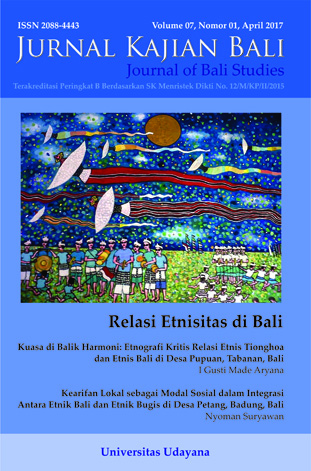Kuasa di balik harmoni: Etnografi kritis relasi etnis Tionghoa dan etnis Bali di desa Pupuan, Tabanan, Bali
Abstract
The relationship between Chinese and local society in Pupuan, Tabanan, Bali is realized through amalgamation marriage and participation as member of the local community organization of Desa Pakraman. This article analyzes the power relation behind the harmony. There are three problems to be discussed in this research i.e.: why the Chinese and Balinese ethnics at Pupuan Village live harmony?; how is the power dynamic behind the harmony relations in Pupuan Village?; and how is the model of education from etnopedagogic perspective which is conducted by two ethnics in Pupuan village? The research method applies qualitative descriptive method with critical ethnography approach. The data was gathered by deep interview, direct observation, and documents study and analyzed by interactive model with critis social theory.The article concluded that the harmonius inter-ethnic relation is happened because power and capital which is played by two ethnics. The power dynamic behind harmonius relation is dynamic and dissolved, in term of religious, political, social cultural, and social economic aspect. In addition, etnophedagogic educational model developed by using variety of media such as media social organizations, social activities media through the model “ngayah” and “ngoupin”, tradition game media, traditionmedia story telling (mesatua), and ritual culture media in public.
Downloads
Download data is not yet available.
Published
2017-05-18
How to Cite
ARYANA, I Gusti Made.
Kuasa di balik harmoni: Etnografi kritis relasi etnis Tionghoa dan etnis Bali di desa Pupuan, Tabanan, Bali.
Jurnal Kajian Bali (Journal of Bali Studies), [S.l.], v. 7, n. 1, p. 1-16, may 2017.
ISSN 2580-0698.
Available at: <https://ojs.unud.ac.id/index.php/kajianbali/article/view/30526>. Date accessed: 20 feb. 2026.
doi: https://doi.org/10.24843/JKB.2017.v07.i01.p01.
Section
Articles
Keywords
power; harmony; critical ethnography; Chinese and Balinese ethnic; ethnopedagogic; Pupuan village

This work is licensed under a Creative Commons Attribution 4.0 International License.



















